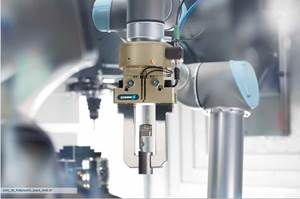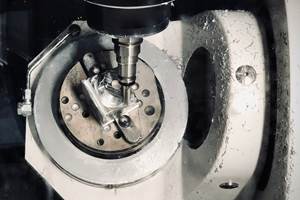Teaming Up For Turning Efficiency
When a Federal-Mogul Corporation's work volume increased five years ago with Ford Motor Company to manufacture polytetraflouroethylene (Teflon) PTFE piston rings, they turned to automated CNC turning centers to turn out millions of rings per year.
Share



Takumi USA
Featured Content
View More
Hwacheon Machinery America, Inc.
Featured Content
View More


ECi Software Solutions, Inc.
Featured Content
View More

When a Federal-Mogul Corporation's work volume increased five years ago with Ford Motor Company to manufacture polytetraflouroethylene (Teflon) PTFE piston rings, Federal-Mogul's Michigan plant turned to Emco-Maier Corporation for automated CNC turning centers to turn out millions of rings per year.
Federal-Mogul, based in Southfield, Michigan, manufactures a range of non-discretionary parts, primarily for automobiles, light and heavy trucks and farm and construction vehicles. It sells parts to the aftermarket and original equipment manufacturer, operates more than 80 distribution centers, 131 international parts stores, 25 plants and four major research centers worldwide.
Its Milan, Michigan plant, located 20 miles south of Ann Arbor, manufactures PTFE seals for automobile and heavy duty truck markets as well as piston rings for Ford Motor Company air conditioning systems. The 215 employees work three shifts to produce the parts from resin to final assembly.
The production of PTFE seals encompasses several steps beginning with the molding of resin in compression presses. After being sintered, the resin is transformed into billets of PTFE with various fillers. The billets are forwarded to the turning department where they are cut into wafers. Once cut, the wafers are assembled into various seals and packaged for sale and distribution. The production of piston rings also begins with the molding of resin into billets. The billets are machined into rings and sent to Ford Motor Company for use in Ford vehicle air conditioning compressors.
The entire process of manufacturing the piston rings and PTFE seals depends on the synchronous operation of each department, said Darryl Krause, manufacturing engineer in the plant's turning department. When Federal-Mogul received the volume increase from Ford Motor Company, the turning department was charged with selecting the specific automated equipment that ensured the continued productivity of its department. In addition, the manufacturer wanted a "turn-key" system that was easily tailored to its production needs.
Federal-Mogul found its answer to increased productivity and efficiency with Emco Maier Corp. Federal-Mogul ran tests at its plant and Emco Maier's facility in Columbus, Ohio, to determine which machine met its Equipment Capabilities Acceptance Procedure which outline stringent regulations on speed, efficiency and accuracy.
Emco Maier's fully automated EMCO Turn 342 CNC turning machine, which runs at 6,000 rpm continuously during operation. was deemed to be the best machine for increasing productivity and met all of Federal-Mogul's standards. Federal-Mogul's turning department now uses EMCO Turn 342 CNC turning machines combined with one of Emco's standard automated systems--the EMCO Front Loader--to pass parts through to the customer just-in-time and with excellent precision.
The machine operators have very little manual contact with the machines; the automation provides for continuous machining without operator intervention, Mr. Krause said. Once the operator loads the raw billets in the loading magazine, Emco's Front Loader automatically loads the billet into the Emco Turn 342 with a swivel gripper. When the machining cycle is complete, the front loader unloads the part. The parts are automatically discharged in the parts catcher and immediately put in a box for shipment to Ford.
The EMCO 342 further, also automatically gages one part while another part is being machined, further increasing Federal-Mogul's productivity.
The EMCO Turn 342s were said to be easily tailored to Federal-Mogul's needs. With minimal modifications--including a simple resizing of the automated swivel head and the resizing of the loading magazinethe machines are able to turn different size parts.
Shortly after Federal-Mogul purchased the automated EMCO Turn 342s, the company purchased additional EMCO Turn 342s. These machines are for flexible machining, are not fully automated and are used specifically for machining PTFE seal elements.
Since the PTFE elements, which are assembled into seals, vary in size and style, operators need to change programs frequently and manually load and unload billets for specific programs. The elements, machined from PTFE billets on the EMCO Turn 342s, are said to be easily programmable using canned cycles. A program can be repeated up to 99 times to machine the maximum number of parts with each setup.
Although the EMCO Turn 342s are not automated, Mr. Krause says they run quicker than other turning machines in his shop. About 80 percent of the total element production is run on the 342s. MMS
Related Content
Lean Approach to Automated Machine Tending Delivers Quicker Paths to Success
Almost any shop can automate at least some of its production, even in low-volume, high-mix applications. The key to getting started is finding the simplest solutions that fit your requirements. It helps to work with an automation partner that understands your needs.
Read MoreOrthopedic Event Discusses Manufacturing Strategies
At the seminar, representatives from multiple companies discussed strategies for making orthopedic devices accurately and efficiently.
Read MoreHow to Successfully Adopt Five-Axis Machining
While there are many changes to adopt when moving to five-axis, they all compliment the overall goal of better parts through less operations.
Read More4 Commonly Misapplied CNC Features
Misapplication of these important CNC features will result in wasted time, wasted or duplicated effort and/or wasted material.
Read MoreRead Next
5 Rules of Thumb for Buying CNC Machine Tools
Use these tips to carefully plan your machine tool purchases and to avoid regretting your decision later.
Read MoreRegistration Now Open for the Precision Machining Technology Show (PMTS) 2025
The precision machining industry’s premier event returns to Cleveland, OH, April 1-3.
Read MoreSetting Up the Building Blocks for a Digital Factory
Woodward Inc. spent over a year developing an API to connect machines to its digital factory. Caron Engineering’s MiConnect has cut most of this process while also granting the shop greater access to machine information.
Read More





























.jpg;maxWidth=300;quality=90)









.jpg;maxWidth=300;quality=90)







